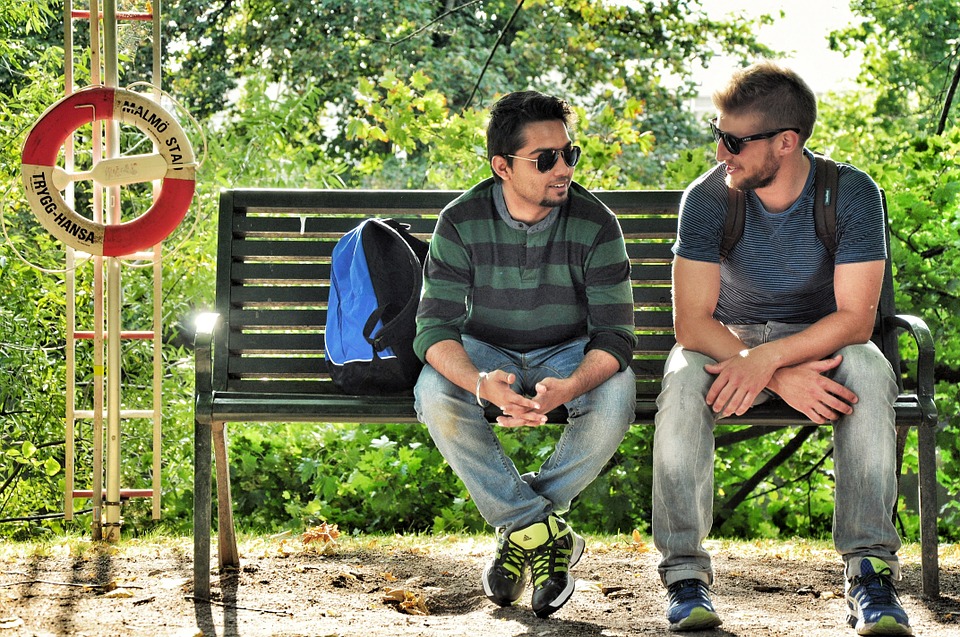
By: Dr. Tyler Fortman
Men are often competitive by nature. While this offers benefits, it can be a real problem for gay men in relationships. These relationships can often be ruined by a competition between partners. Who is more attractive? Who has more professional success? Who has the strongest social support network? Yet, despite these challenges, gay men (like almost all people) group together and form relationships. These “tribes,” if you will, are an evolutionary asset to improve one’s chances of survival. Fortunately, the stages of tribal development offer a guideline that can leverage the masculine tendency to compete in a way that allows them (and you) to develop stronger relationships with other men.
Stages:
Stage 1:
In the first stage of development, people often feel alienated. The general impression is that “life sucks.” Relationships in this stage are typically abusive or don’t last long. Partners act out in hostile ways toward one another because the focus is on personal survival, not the health or success of the relationship. In larger tribes, prisons and gangs function in this stage.
If you’re in a relationship like this one, you might consider getting out. It’s quite difficult to overcome the current dynamic; but, if it can be overcome, many ruptures to the relationship will need to be repaired. If you aren’t going to leave the relationship, consider gravitating toward activities and settings where the most positive interactions occur. It’s crucial to consider your own safety – emotional and physical. You might also try highlighting times that improvements in the lives of others improved your life and life of your partner.
Stage 2:
The second stage is characterized by feeling separated from one’s partner. The phrase, “my life sucks” might capture your experience. Partners are often apathetic to the relationship dynamic and even act passively antagonistic. Sometimes, efforts to antagonize (e.g. crossing arms, aggressive sarcasm, resignation) is an effort to bait one’s partner into reacting; thereby, demonstrating to the antagonist that they aren’t alone. If you (or your partner) consistently decline the other’s offer to walk around Millennium Park, stroll Montrose Beach, or grab a burger at DMK, yet you crave quality time, you’re likely in Stage 2.
Making changes in this stage requires a commitment to improvement and sharing your desire that the relationship be different. Work hard to instill a sense of hope that things can change and put in extra effort when you get the sense that your partner wants something to be different. Compliment your partner’s strengths and express your commitment to one another – over and over again.
Stage 3:
For gay men, stage 3 is a common one. This is the stage in which partners express an attitude that “I’m great, and you’re not.” It’s sometimes referred to as the stage of “personal domination.” A common response is a feeling of competition within the relationship. Partners might even strategize and make efforts to get ahead of their partner (i.e., make more money, earn more prestige, be more physically attractive, control social contacts, etc.). This stage is maintained by the positive feeling one feels when they have “bested” someone else, namely their partner. However, a consequence is a pervasive feeling of loneliness and disappointment in both one’s partner and also the relationship.
If your relationship is in stage 3, consider taking a strong look at yourself. A sense of competition is rarely sustainable when only one person is competing. So, consider where you are attempting to best you partner and try acting opposite and supporting their success. Also work to reflect your partner’s strengths and values. Identify where their values overlap with your own (What values do you share?) and then create goals that require both of your success to be achieved.
Stage 4:
We see a shift in the focus of competition in stage 4. Instead of individuals competing with their partners, stage 4 partners are unified in their competition against other couples or groups. The general feeling is that “we’re great” and the other group isn’t. Although competing against others is a powerfully uniting force, it also focuses improvement on “getting ahead” rather than being the best a relationship can be. Notably, the focus is still on improving in relation to another. Consider if their are consequences to focusing on others as a motivation to change. If so, how could you better focus your relationship improvements for the sake of your own relationship.
Stage 5:
Stage 5 is rare, but filled with energy. People often describe stage 5 relationships as “alive.” Individuals in the relationship are very aware that the relationship is strong and focus on continuing to improve. However, instead of improving to be better than another couple, these relationships want to improve to test the limit of greatness. “Just how good can a relationship be?,” these couples are asking. These relationships are filled with shared visions and inspiration. If you’re in a stage 5 relationship, well frankly, you don’t really care what comes next. You already have a vision of what you want it to be (even if you’ve never seen an example of it) and you’re working toward it.
The stages of tribal development are typically used to describe larger organizations. In fact, using these guidelines, business consultants, Dave Logan and Halee Fischer-Wright, and athletics coaches, Phil Jackson and Urban Meyer, have leveraged the tendency to compete in order to create stronger teams and repeated success. Try applying the same to your relationship and enjoy the ride!

